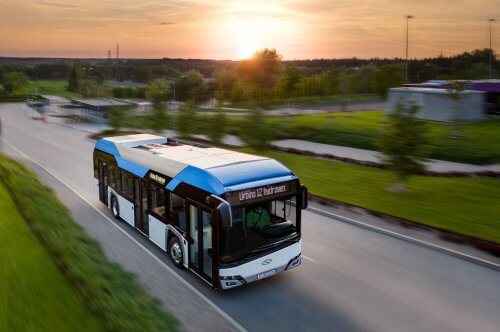
A European consortium is bringing together 25 leading organisations in the hydrogen sector to define, develop and test the first European standard for fuel cell modules for heavy duty applications. The new standard aims to enhance market competitiveness by enabling competition, cost reduction and mass production.
The consortium, operating together as StasHH (Standard Size Heavy-duty Hydrogen), comprises 11 fuel cell module suppliers, nine original equipment manufacturers and five research, test, engineering and/or knowledge institutes and will standardise physical dimensions, flow and digital interfaces, test protocols and safety requirements of the fuel cell modules that can be stacked and integrated in heavy duty applications like forklifts, buses, trucks, trains, ships, and construction equipment.
The consortium is receiving €7.5m funding from the European Union, through the Fuel Cells and Hydrogen Joint Undertaking (FCH JU), in order to kick start the adoption of fuel cells in the heavy duty sector. The size nomenclature for batteries has been well established over time and the common AA battery has become a standard size across multiple applications. A similar standard, to be known as the HH-series, is envisioned by the StasHH consortium for fuel cell modules, which are at the heart of any fuel cell system.
Upon reaching an industrial consensus between fuel cell module suppliers and OEMs regarding the standard, the fuel cell module suppliers in the consortium will then design and develop standardised modules for different power classes. The modules will be tested by the test centres in the consortium using key indicators to benchmark performance and safety.
Meanwhile the consortium will also promote the standard at the appropriate European and international regulation, codes and standards levels to enable the worldwide adoption of the standard.
The StasHH project has received funding from the FCH JU, which receives support from the European Union’s Horizon 2020 Research and Innovation programme, Hydrogen Europe and Hydrogen Europe Research.
Bart Biebuyck, Executive Director at FCH JU, said: “We are proud to support this strategically important project as a main step towards the decarbonisation of the transport sector. The project outcomes of StasHH will not only stimulate greater competition among fuel cell suppliers, but will also enrich the offer and make it easier to integrate fuel cells systems in heavy-duty powertrains. With its specific focus on the heavy-truck sector, this project will play an essential role in reaching the common target of 100.000 trucks by 2030 set in the joint coalition statement of industry representatives last December.”
Federico Zenith, Coordinator of the StasHH consortium, added: “StasHH is Europe’s best chance to jump-start the adoption of hydrogen in heavy-duty mobility, a sector that cannot be easily electrified with batteries due to weight, cost or other limitations. Pooling together multiple markets and enabling competition, mass production and automation, we aim to make a decisive contribution to the phase-out of fossil fuels and to deploy new technology for a better society.”

